Omission and Causation in Criminal Law: A Case Study Analysis Report
VerifiedAdded on 2022/12/27
|9
|2429
|46
Report
AI Summary
This report presents a detailed analysis of a criminal law case involving omission and causation. The case involves Paul, Stuart, Jack, Nurse June, and Dr. Green, exploring the legal implications of their actions and inactions. The report applies the ILAC method (Issue, Law, Analysis, Conclusion) to examine the responsibilities and liabilities of each party. It addresses whether Paul had a duty to care for Stuart, whether Nurse June was liable for failing to assist Jack, and whether Dr. Green was negligent in treating Jack. The analysis incorporates relevant case laws, such as R vs. Khan & Khan and Anderson vs. Heathwood, to determine the causation of events and the resulting legal consequences. The conclusion emphasizes the importance of determining causation in criminal offenses and the legal duties imposed on individuals to prevent harm, highlighting the punishable nature of omissions that lead to injury or harm.
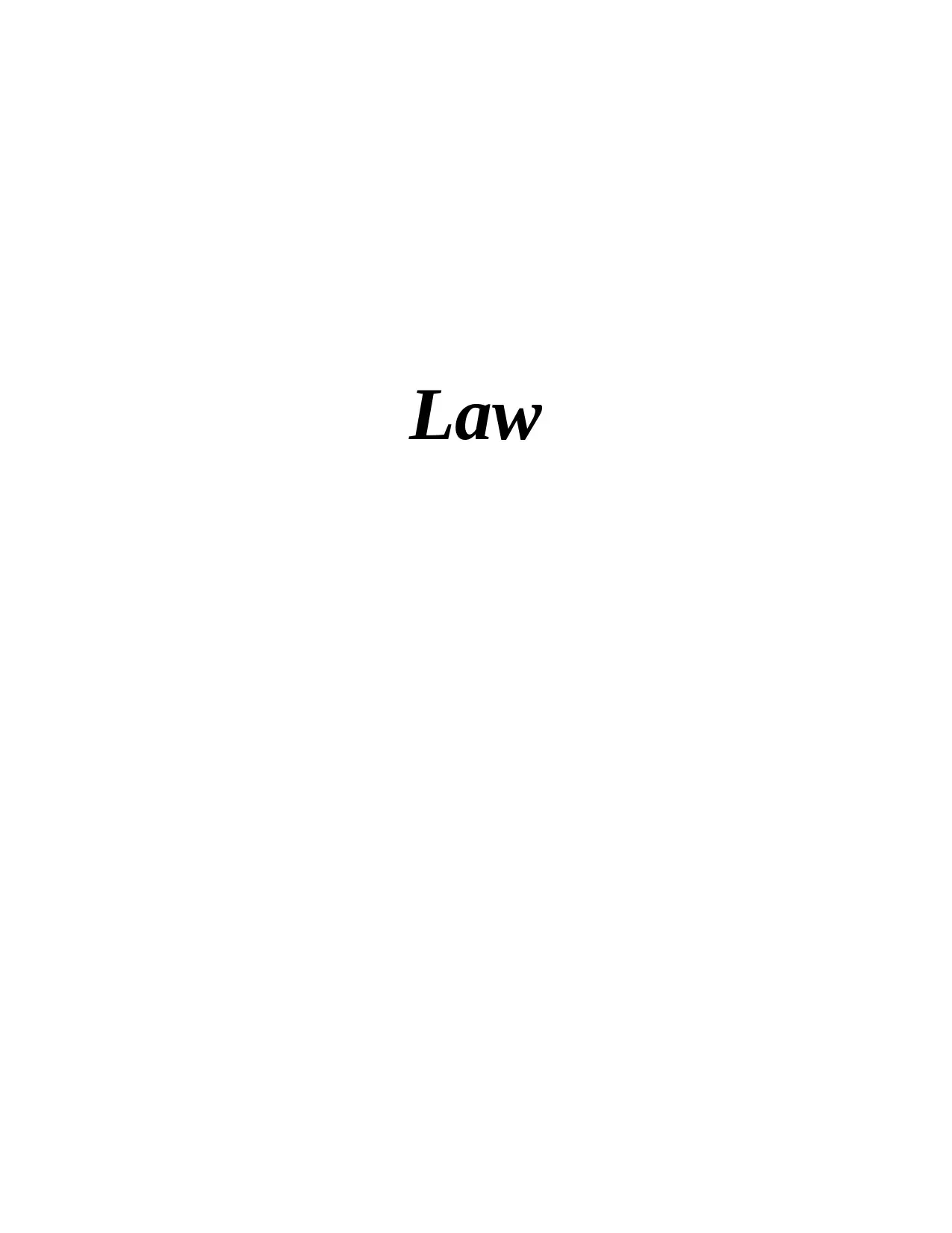
Law
Paraphrase This Document
Need a fresh take? Get an instant paraphrase of this document with our AI Paraphraser
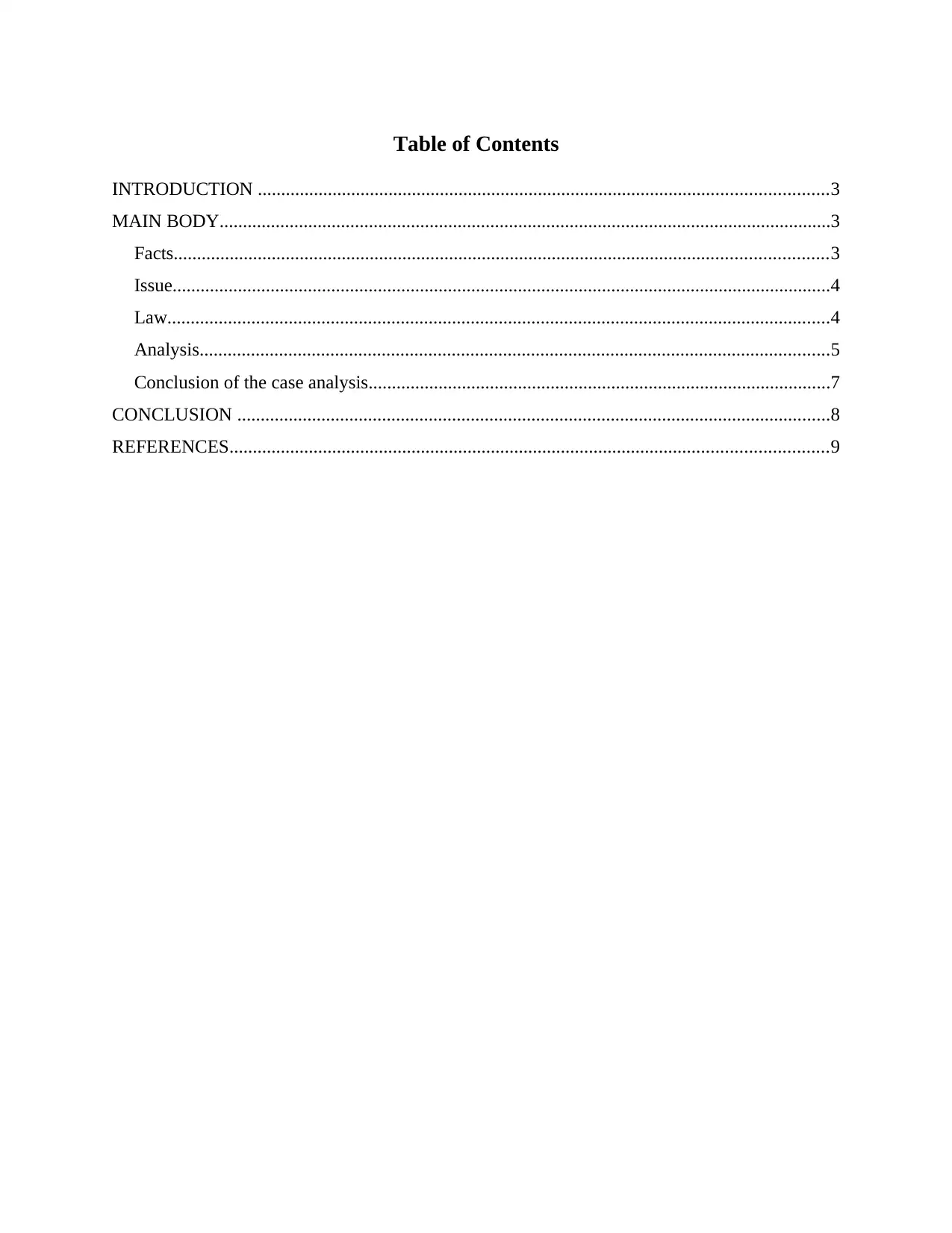
Table of Contents
INTRODUCTION ..........................................................................................................................3
MAIN BODY...................................................................................................................................3
Facts............................................................................................................................................3
Issue.............................................................................................................................................4
Law..............................................................................................................................................4
Analysis.......................................................................................................................................5
Conclusion of the case analysis...................................................................................................7
CONCLUSION ...............................................................................................................................8
REFERENCES................................................................................................................................9
INTRODUCTION ..........................................................................................................................3
MAIN BODY...................................................................................................................................3
Facts............................................................................................................................................3
Issue.............................................................................................................................................4
Law..............................................................................................................................................4
Analysis.......................................................................................................................................5
Conclusion of the case analysis...................................................................................................7
CONCLUSION ...............................................................................................................................8
REFERENCES................................................................................................................................9
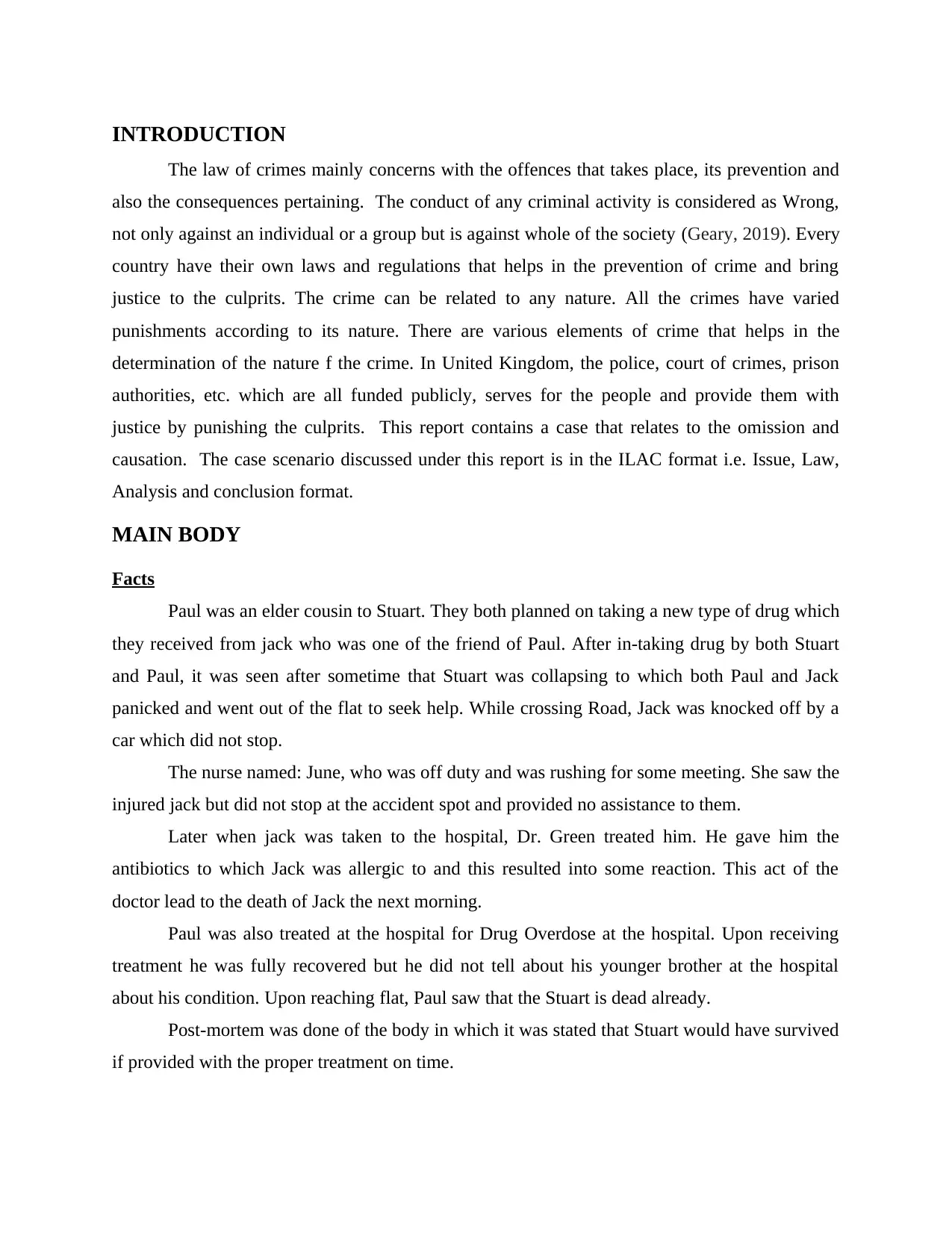
INTRODUCTION
The law of crimes mainly concerns with the offences that takes place, its prevention and
also the consequences pertaining. The conduct of any criminal activity is considered as Wrong,
not only against an individual or a group but is against whole of the society (Geary, 2019). Every
country have their own laws and regulations that helps in the prevention of crime and bring
justice to the culprits. The crime can be related to any nature. All the crimes have varied
punishments according to its nature. There are various elements of crime that helps in the
determination of the nature f the crime. In United Kingdom, the police, court of crimes, prison
authorities, etc. which are all funded publicly, serves for the people and provide them with
justice by punishing the culprits. This report contains a case that relates to the omission and
causation. The case scenario discussed under this report is in the ILAC format i.e. Issue, Law,
Analysis and conclusion format.
MAIN BODY
Facts
Paul was an elder cousin to Stuart. They both planned on taking a new type of drug which
they received from jack who was one of the friend of Paul. After in-taking drug by both Stuart
and Paul, it was seen after sometime that Stuart was collapsing to which both Paul and Jack
panicked and went out of the flat to seek help. While crossing Road, Jack was knocked off by a
car which did not stop.
The nurse named: June, who was off duty and was rushing for some meeting. She saw the
injured jack but did not stop at the accident spot and provided no assistance to them.
Later when jack was taken to the hospital, Dr. Green treated him. He gave him the
antibiotics to which Jack was allergic to and this resulted into some reaction. This act of the
doctor lead to the death of Jack the next morning.
Paul was also treated at the hospital for Drug Overdose at the hospital. Upon receiving
treatment he was fully recovered but he did not tell about his younger brother at the hospital
about his condition. Upon reaching flat, Paul saw that the Stuart is dead already.
Post-mortem was done of the body in which it was stated that Stuart would have survived
if provided with the proper treatment on time.
The law of crimes mainly concerns with the offences that takes place, its prevention and
also the consequences pertaining. The conduct of any criminal activity is considered as Wrong,
not only against an individual or a group but is against whole of the society (Geary, 2019). Every
country have their own laws and regulations that helps in the prevention of crime and bring
justice to the culprits. The crime can be related to any nature. All the crimes have varied
punishments according to its nature. There are various elements of crime that helps in the
determination of the nature f the crime. In United Kingdom, the police, court of crimes, prison
authorities, etc. which are all funded publicly, serves for the people and provide them with
justice by punishing the culprits. This report contains a case that relates to the omission and
causation. The case scenario discussed under this report is in the ILAC format i.e. Issue, Law,
Analysis and conclusion format.
MAIN BODY
Facts
Paul was an elder cousin to Stuart. They both planned on taking a new type of drug which
they received from jack who was one of the friend of Paul. After in-taking drug by both Stuart
and Paul, it was seen after sometime that Stuart was collapsing to which both Paul and Jack
panicked and went out of the flat to seek help. While crossing Road, Jack was knocked off by a
car which did not stop.
The nurse named: June, who was off duty and was rushing for some meeting. She saw the
injured jack but did not stop at the accident spot and provided no assistance to them.
Later when jack was taken to the hospital, Dr. Green treated him. He gave him the
antibiotics to which Jack was allergic to and this resulted into some reaction. This act of the
doctor lead to the death of Jack the next morning.
Paul was also treated at the hospital for Drug Overdose at the hospital. Upon receiving
treatment he was fully recovered but he did not tell about his younger brother at the hospital
about his condition. Upon reaching flat, Paul saw that the Stuart is dead already.
Post-mortem was done of the body in which it was stated that Stuart would have survived
if provided with the proper treatment on time.
⊘ This is a preview!⊘
Do you want full access?
Subscribe today to unlock all pages.

Trusted by 1+ million students worldwide
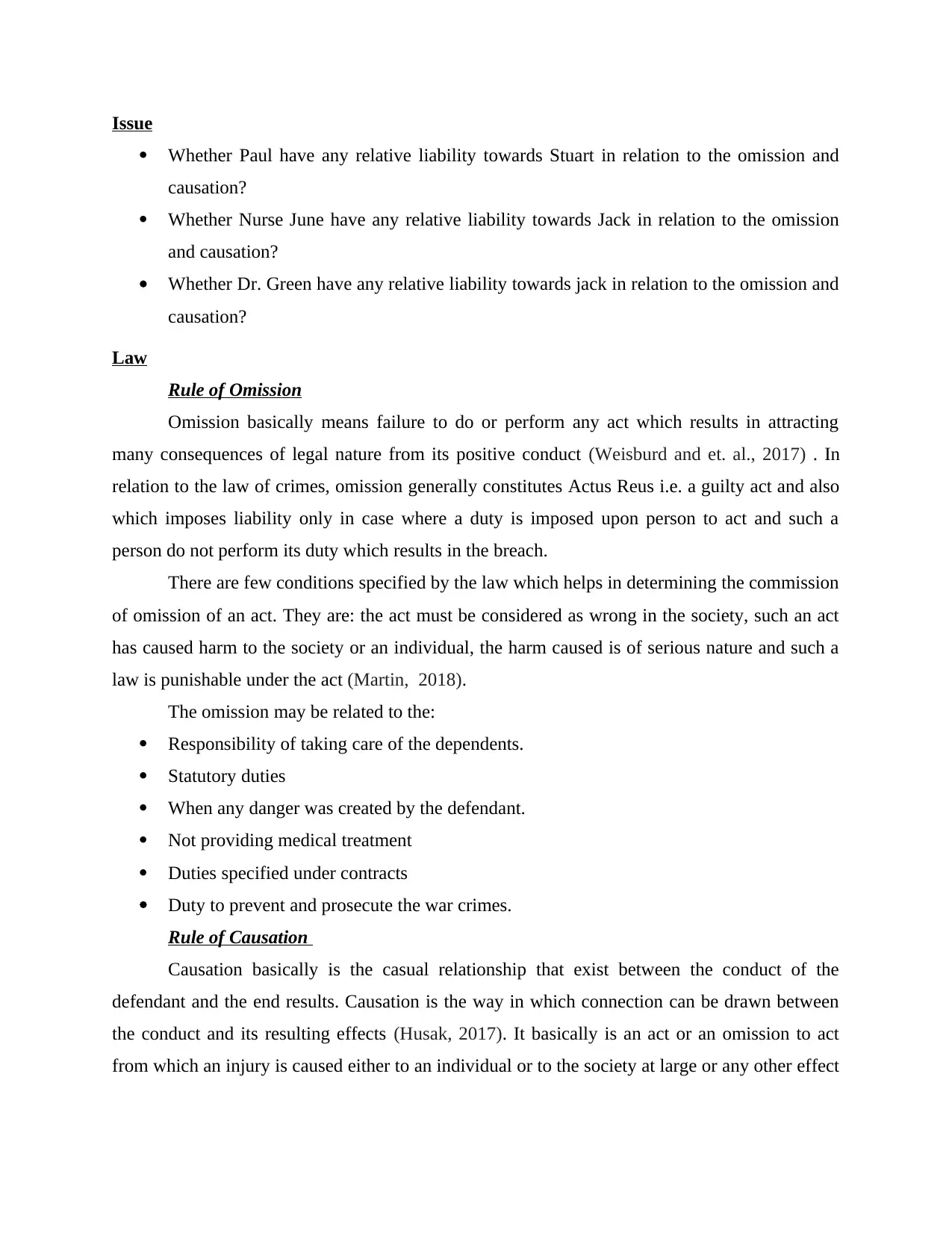
Issue
Whether Paul have any relative liability towards Stuart in relation to the omission and
causation?
Whether Nurse June have any relative liability towards Jack in relation to the omission
and causation?
Whether Dr. Green have any relative liability towards jack in relation to the omission and
causation?
Law
Rule of Omission
Omission basically means failure to do or perform any act which results in attracting
many consequences of legal nature from its positive conduct (Weisburd and et. al., 2017) . In
relation to the law of crimes, omission generally constitutes Actus Reus i.e. a guilty act and also
which imposes liability only in case where a duty is imposed upon person to act and such a
person do not perform its duty which results in the breach.
There are few conditions specified by the law which helps in determining the commission
of omission of an act. They are: the act must be considered as wrong in the society, such an act
has caused harm to the society or an individual, the harm caused is of serious nature and such a
law is punishable under the act (Martin, 2018).
The omission may be related to the:
Responsibility of taking care of the dependents.
Statutory duties
When any danger was created by the defendant.
Not providing medical treatment
Duties specified under contracts
Duty to prevent and prosecute the war crimes.
Rule of Causation
Causation basically is the casual relationship that exist between the conduct of the
defendant and the end results. Causation is the way in which connection can be drawn between
the conduct and its resulting effects (Husak, 2017). It basically is an act or an omission to act
from which an injury is caused either to an individual or to the society at large or any other effect
Whether Paul have any relative liability towards Stuart in relation to the omission and
causation?
Whether Nurse June have any relative liability towards Jack in relation to the omission
and causation?
Whether Dr. Green have any relative liability towards jack in relation to the omission and
causation?
Law
Rule of Omission
Omission basically means failure to do or perform any act which results in attracting
many consequences of legal nature from its positive conduct (Weisburd and et. al., 2017) . In
relation to the law of crimes, omission generally constitutes Actus Reus i.e. a guilty act and also
which imposes liability only in case where a duty is imposed upon person to act and such a
person do not perform its duty which results in the breach.
There are few conditions specified by the law which helps in determining the commission
of omission of an act. They are: the act must be considered as wrong in the society, such an act
has caused harm to the society or an individual, the harm caused is of serious nature and such a
law is punishable under the act (Martin, 2018).
The omission may be related to the:
Responsibility of taking care of the dependents.
Statutory duties
When any danger was created by the defendant.
Not providing medical treatment
Duties specified under contracts
Duty to prevent and prosecute the war crimes.
Rule of Causation
Causation basically is the casual relationship that exist between the conduct of the
defendant and the end results. Causation is the way in which connection can be drawn between
the conduct and its resulting effects (Husak, 2017). It basically is an act or an omission to act
from which an injury is caused either to an individual or to the society at large or any other effect
Paraphrase This Document
Need a fresh take? Get an instant paraphrase of this document with our AI Paraphraser
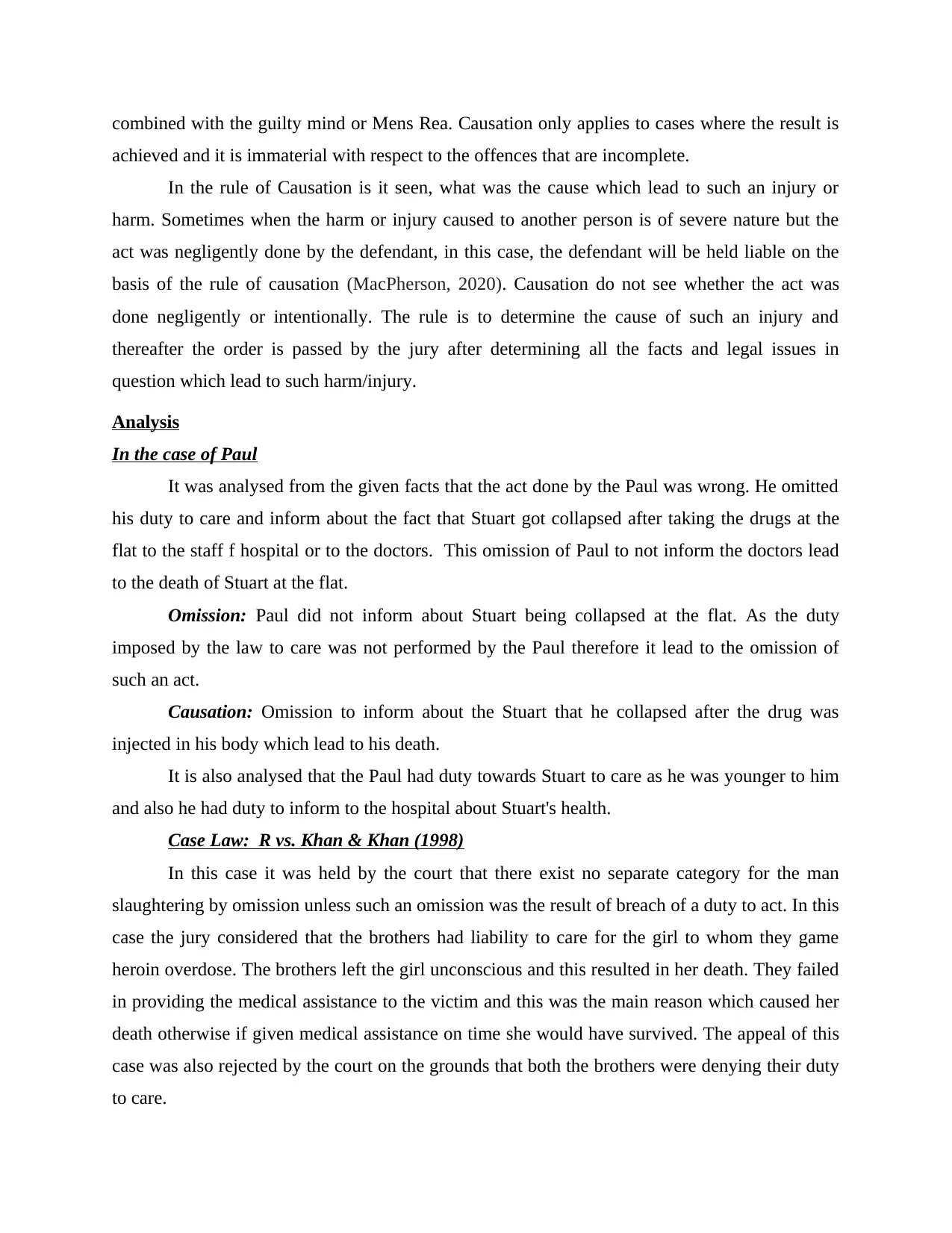
combined with the guilty mind or Mens Rea. Causation only applies to cases where the result is
achieved and it is immaterial with respect to the offences that are incomplete.
In the rule of Causation is it seen, what was the cause which lead to such an injury or
harm. Sometimes when the harm or injury caused to another person is of severe nature but the
act was negligently done by the defendant, in this case, the defendant will be held liable on the
basis of the rule of causation (MacPherson, 2020). Causation do not see whether the act was
done negligently or intentionally. The rule is to determine the cause of such an injury and
thereafter the order is passed by the jury after determining all the facts and legal issues in
question which lead to such harm/injury.
Analysis
In the case of Paul
It was analysed from the given facts that the act done by the Paul was wrong. He omitted
his duty to care and inform about the fact that Stuart got collapsed after taking the drugs at the
flat to the staff f hospital or to the doctors. This omission of Paul to not inform the doctors lead
to the death of Stuart at the flat.
Omission: Paul did not inform about Stuart being collapsed at the flat. As the duty
imposed by the law to care was not performed by the Paul therefore it lead to the omission of
such an act.
Causation: Omission to inform about the Stuart that he collapsed after the drug was
injected in his body which lead to his death.
It is also analysed that the Paul had duty towards Stuart to care as he was younger to him
and also he had duty to inform to the hospital about Stuart's health.
Case Law: R vs. Khan & Khan (1998)
In this case it was held by the court that there exist no separate category for the man
slaughtering by omission unless such an omission was the result of breach of a duty to act. In this
case the jury considered that the brothers had liability to care for the girl to whom they game
heroin overdose. The brothers left the girl unconscious and this resulted in her death. They failed
in providing the medical assistance to the victim and this was the main reason which caused her
death otherwise if given medical assistance on time she would have survived. The appeal of this
case was also rejected by the court on the grounds that both the brothers were denying their duty
to care.
achieved and it is immaterial with respect to the offences that are incomplete.
In the rule of Causation is it seen, what was the cause which lead to such an injury or
harm. Sometimes when the harm or injury caused to another person is of severe nature but the
act was negligently done by the defendant, in this case, the defendant will be held liable on the
basis of the rule of causation (MacPherson, 2020). Causation do not see whether the act was
done negligently or intentionally. The rule is to determine the cause of such an injury and
thereafter the order is passed by the jury after determining all the facts and legal issues in
question which lead to such harm/injury.
Analysis
In the case of Paul
It was analysed from the given facts that the act done by the Paul was wrong. He omitted
his duty to care and inform about the fact that Stuart got collapsed after taking the drugs at the
flat to the staff f hospital or to the doctors. This omission of Paul to not inform the doctors lead
to the death of Stuart at the flat.
Omission: Paul did not inform about Stuart being collapsed at the flat. As the duty
imposed by the law to care was not performed by the Paul therefore it lead to the omission of
such an act.
Causation: Omission to inform about the Stuart that he collapsed after the drug was
injected in his body which lead to his death.
It is also analysed that the Paul had duty towards Stuart to care as he was younger to him
and also he had duty to inform to the hospital about Stuart's health.
Case Law: R vs. Khan & Khan (1998)
In this case it was held by the court that there exist no separate category for the man
slaughtering by omission unless such an omission was the result of breach of a duty to act. In this
case the jury considered that the brothers had liability to care for the girl to whom they game
heroin overdose. The brothers left the girl unconscious and this resulted in her death. They failed
in providing the medical assistance to the victim and this was the main reason which caused her
death otherwise if given medical assistance on time she would have survived. The appeal of this
case was also rejected by the court on the grounds that both the brothers were denying their duty
to care.
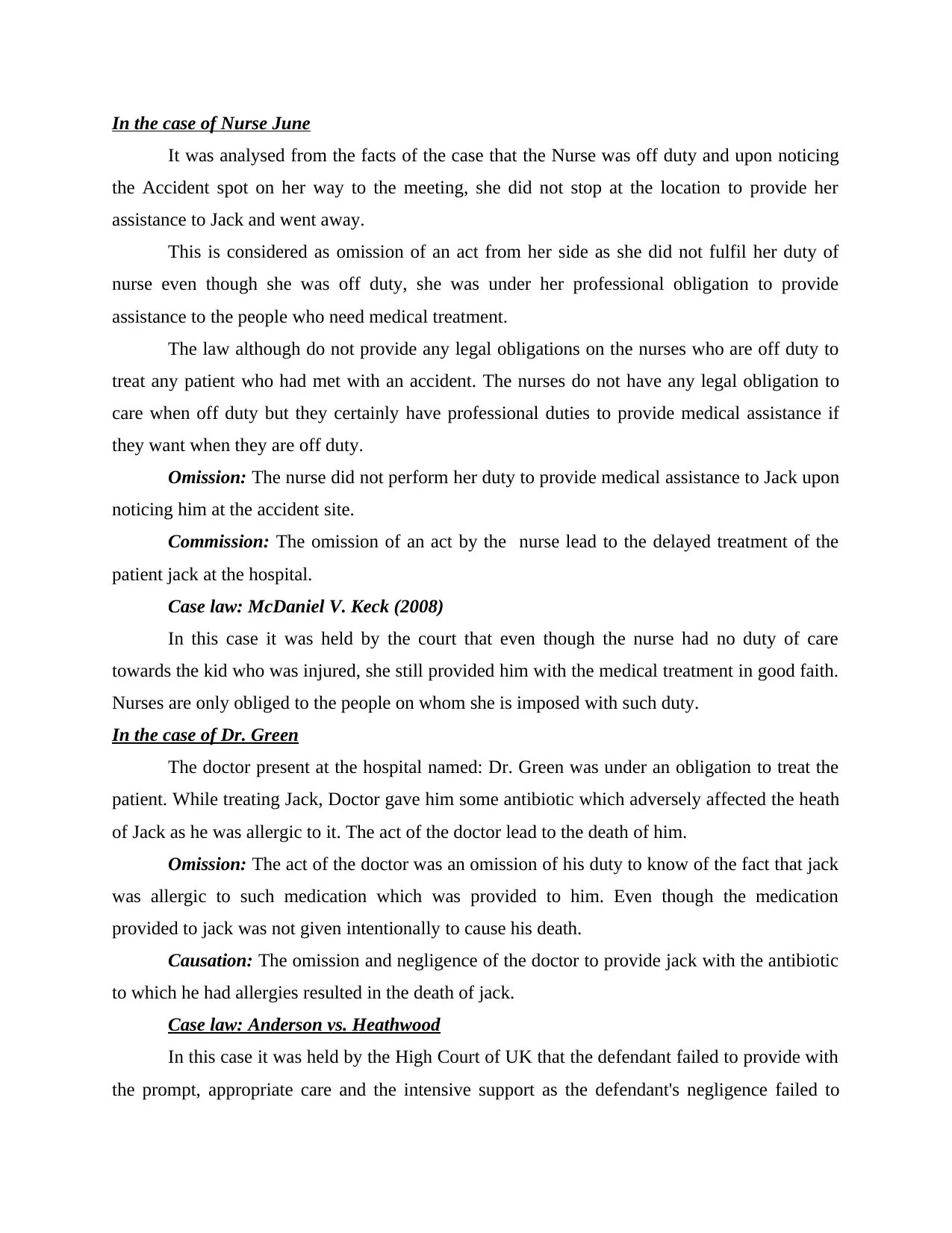
In the case of Nurse June
It was analysed from the facts of the case that the Nurse was off duty and upon noticing
the Accident spot on her way to the meeting, she did not stop at the location to provide her
assistance to Jack and went away.
This is considered as omission of an act from her side as she did not fulfil her duty of
nurse even though she was off duty, she was under her professional obligation to provide
assistance to the people who need medical treatment.
The law although do not provide any legal obligations on the nurses who are off duty to
treat any patient who had met with an accident. The nurses do not have any legal obligation to
care when off duty but they certainly have professional duties to provide medical assistance if
they want when they are off duty.
Omission: The nurse did not perform her duty to provide medical assistance to Jack upon
noticing him at the accident site.
Commission: The omission of an act by the nurse lead to the delayed treatment of the
patient jack at the hospital.
Case law: McDaniel V. Keck (2008)
In this case it was held by the court that even though the nurse had no duty of care
towards the kid who was injured, she still provided him with the medical treatment in good faith.
Nurses are only obliged to the people on whom she is imposed with such duty.
In the case of Dr. Green
The doctor present at the hospital named: Dr. Green was under an obligation to treat the
patient. While treating Jack, Doctor gave him some antibiotic which adversely affected the heath
of Jack as he was allergic to it. The act of the doctor lead to the death of him.
Omission: The act of the doctor was an omission of his duty to know of the fact that jack
was allergic to such medication which was provided to him. Even though the medication
provided to jack was not given intentionally to cause his death.
Causation: The omission and negligence of the doctor to provide jack with the antibiotic
to which he had allergies resulted in the death of jack.
Case law: Anderson vs. Heathwood
In this case it was held by the High Court of UK that the defendant failed to provide with
the prompt, appropriate care and the intensive support as the defendant's negligence failed to
It was analysed from the facts of the case that the Nurse was off duty and upon noticing
the Accident spot on her way to the meeting, she did not stop at the location to provide her
assistance to Jack and went away.
This is considered as omission of an act from her side as she did not fulfil her duty of
nurse even though she was off duty, she was under her professional obligation to provide
assistance to the people who need medical treatment.
The law although do not provide any legal obligations on the nurses who are off duty to
treat any patient who had met with an accident. The nurses do not have any legal obligation to
care when off duty but they certainly have professional duties to provide medical assistance if
they want when they are off duty.
Omission: The nurse did not perform her duty to provide medical assistance to Jack upon
noticing him at the accident site.
Commission: The omission of an act by the nurse lead to the delayed treatment of the
patient jack at the hospital.
Case law: McDaniel V. Keck (2008)
In this case it was held by the court that even though the nurse had no duty of care
towards the kid who was injured, she still provided him with the medical treatment in good faith.
Nurses are only obliged to the people on whom she is imposed with such duty.
In the case of Dr. Green
The doctor present at the hospital named: Dr. Green was under an obligation to treat the
patient. While treating Jack, Doctor gave him some antibiotic which adversely affected the heath
of Jack as he was allergic to it. The act of the doctor lead to the death of him.
Omission: The act of the doctor was an omission of his duty to know of the fact that jack
was allergic to such medication which was provided to him. Even though the medication
provided to jack was not given intentionally to cause his death.
Causation: The omission and negligence of the doctor to provide jack with the antibiotic
to which he had allergies resulted in the death of jack.
Case law: Anderson vs. Heathwood
In this case it was held by the High Court of UK that the defendant failed to provide with
the prompt, appropriate care and the intensive support as the defendant's negligence failed to
⊘ This is a preview!⊘
Do you want full access?
Subscribe today to unlock all pages.

Trusted by 1+ million students worldwide
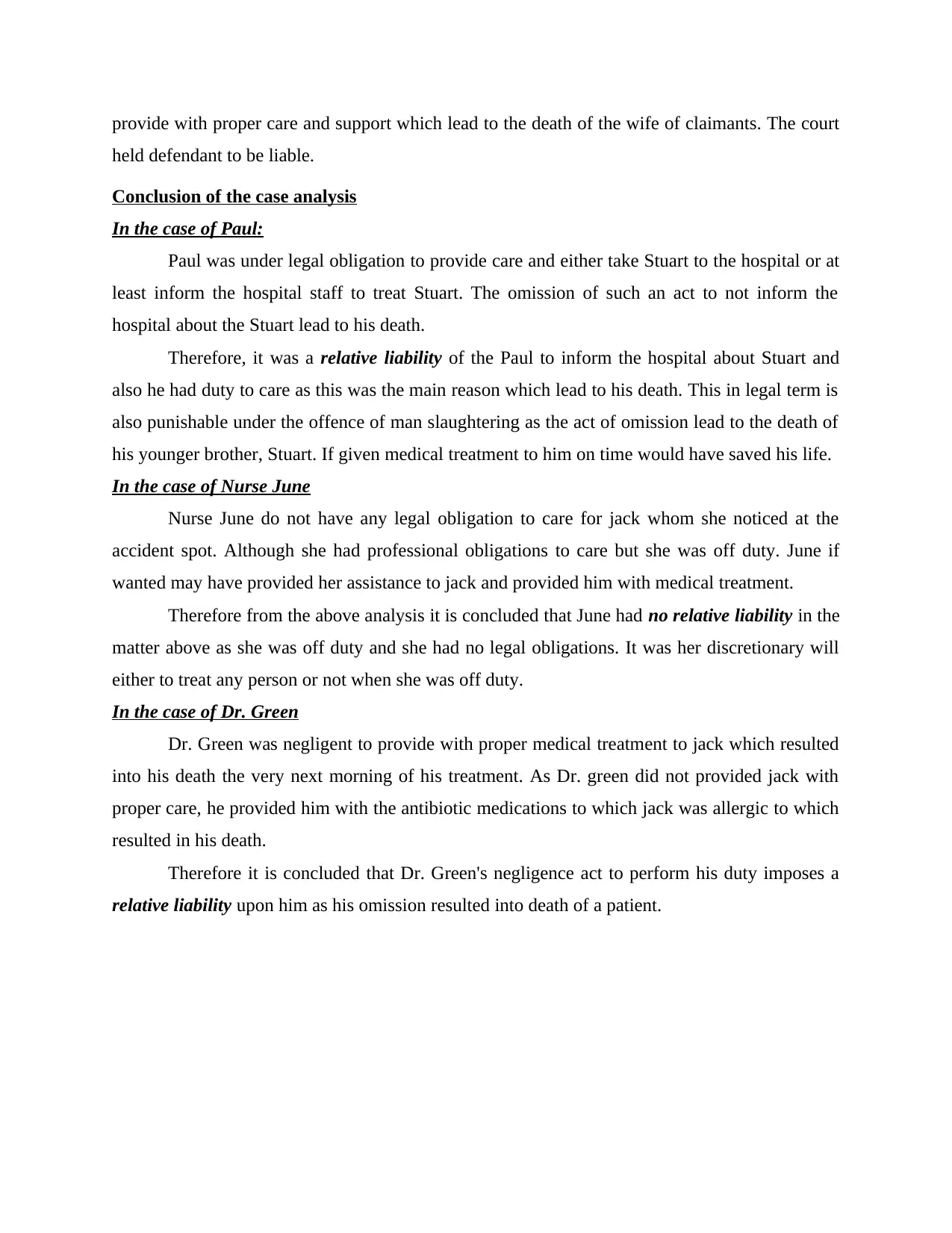
provide with proper care and support which lead to the death of the wife of claimants. The court
held defendant to be liable.
Conclusion of the case analysis
In the case of Paul:
Paul was under legal obligation to provide care and either take Stuart to the hospital or at
least inform the hospital staff to treat Stuart. The omission of such an act to not inform the
hospital about the Stuart lead to his death.
Therefore, it was a relative liability of the Paul to inform the hospital about Stuart and
also he had duty to care as this was the main reason which lead to his death. This in legal term is
also punishable under the offence of man slaughtering as the act of omission lead to the death of
his younger brother, Stuart. If given medical treatment to him on time would have saved his life.
In the case of Nurse June
Nurse June do not have any legal obligation to care for jack whom she noticed at the
accident spot. Although she had professional obligations to care but she was off duty. June if
wanted may have provided her assistance to jack and provided him with medical treatment.
Therefore from the above analysis it is concluded that June had no relative liability in the
matter above as she was off duty and she had no legal obligations. It was her discretionary will
either to treat any person or not when she was off duty.
In the case of Dr. Green
Dr. Green was negligent to provide with proper medical treatment to jack which resulted
into his death the very next morning of his treatment. As Dr. green did not provided jack with
proper care, he provided him with the antibiotic medications to which jack was allergic to which
resulted in his death.
Therefore it is concluded that Dr. Green's negligence act to perform his duty imposes a
relative liability upon him as his omission resulted into death of a patient.
held defendant to be liable.
Conclusion of the case analysis
In the case of Paul:
Paul was under legal obligation to provide care and either take Stuart to the hospital or at
least inform the hospital staff to treat Stuart. The omission of such an act to not inform the
hospital about the Stuart lead to his death.
Therefore, it was a relative liability of the Paul to inform the hospital about Stuart and
also he had duty to care as this was the main reason which lead to his death. This in legal term is
also punishable under the offence of man slaughtering as the act of omission lead to the death of
his younger brother, Stuart. If given medical treatment to him on time would have saved his life.
In the case of Nurse June
Nurse June do not have any legal obligation to care for jack whom she noticed at the
accident spot. Although she had professional obligations to care but she was off duty. June if
wanted may have provided her assistance to jack and provided him with medical treatment.
Therefore from the above analysis it is concluded that June had no relative liability in the
matter above as she was off duty and she had no legal obligations. It was her discretionary will
either to treat any person or not when she was off duty.
In the case of Dr. Green
Dr. Green was negligent to provide with proper medical treatment to jack which resulted
into his death the very next morning of his treatment. As Dr. green did not provided jack with
proper care, he provided him with the antibiotic medications to which jack was allergic to which
resulted in his death.
Therefore it is concluded that Dr. Green's negligence act to perform his duty imposes a
relative liability upon him as his omission resulted into death of a patient.
Paraphrase This Document
Need a fresh take? Get an instant paraphrase of this document with our AI Paraphraser
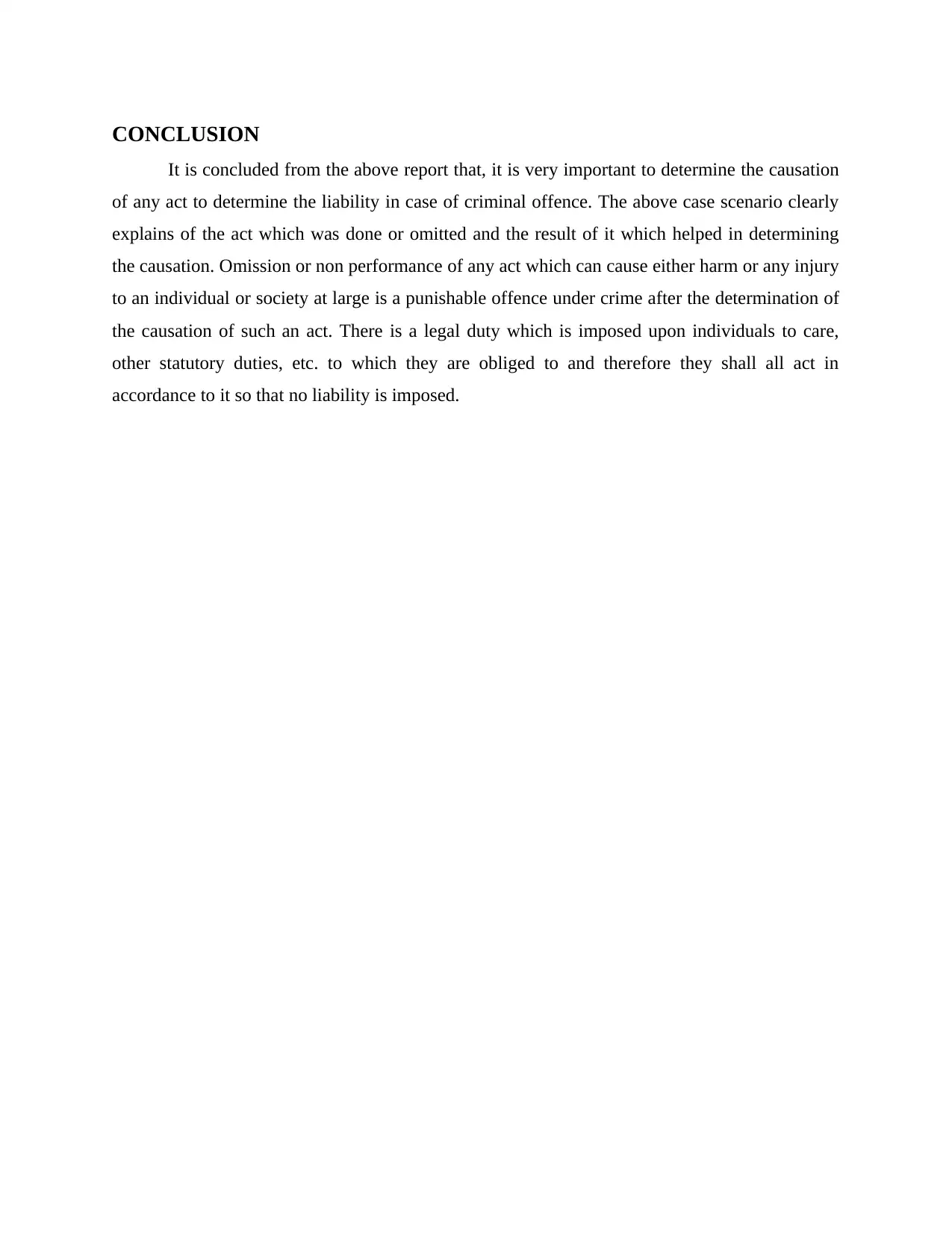
CONCLUSION
It is concluded from the above report that, it is very important to determine the causation
of any act to determine the liability in case of criminal offence. The above case scenario clearly
explains of the act which was done or omitted and the result of it which helped in determining
the causation. Omission or non performance of any act which can cause either harm or any injury
to an individual or society at large is a punishable offence under crime after the determination of
the causation of such an act. There is a legal duty which is imposed upon individuals to care,
other statutory duties, etc. to which they are obliged to and therefore they shall all act in
accordance to it so that no liability is imposed.
It is concluded from the above report that, it is very important to determine the causation
of any act to determine the liability in case of criminal offence. The above case scenario clearly
explains of the act which was done or omitted and the result of it which helped in determining
the causation. Omission or non performance of any act which can cause either harm or any injury
to an individual or society at large is a punishable offence under crime after the determination of
the causation of such an act. There is a legal duty which is imposed upon individuals to care,
other statutory duties, etc. to which they are obliged to and therefore they shall all act in
accordance to it so that no liability is imposed.
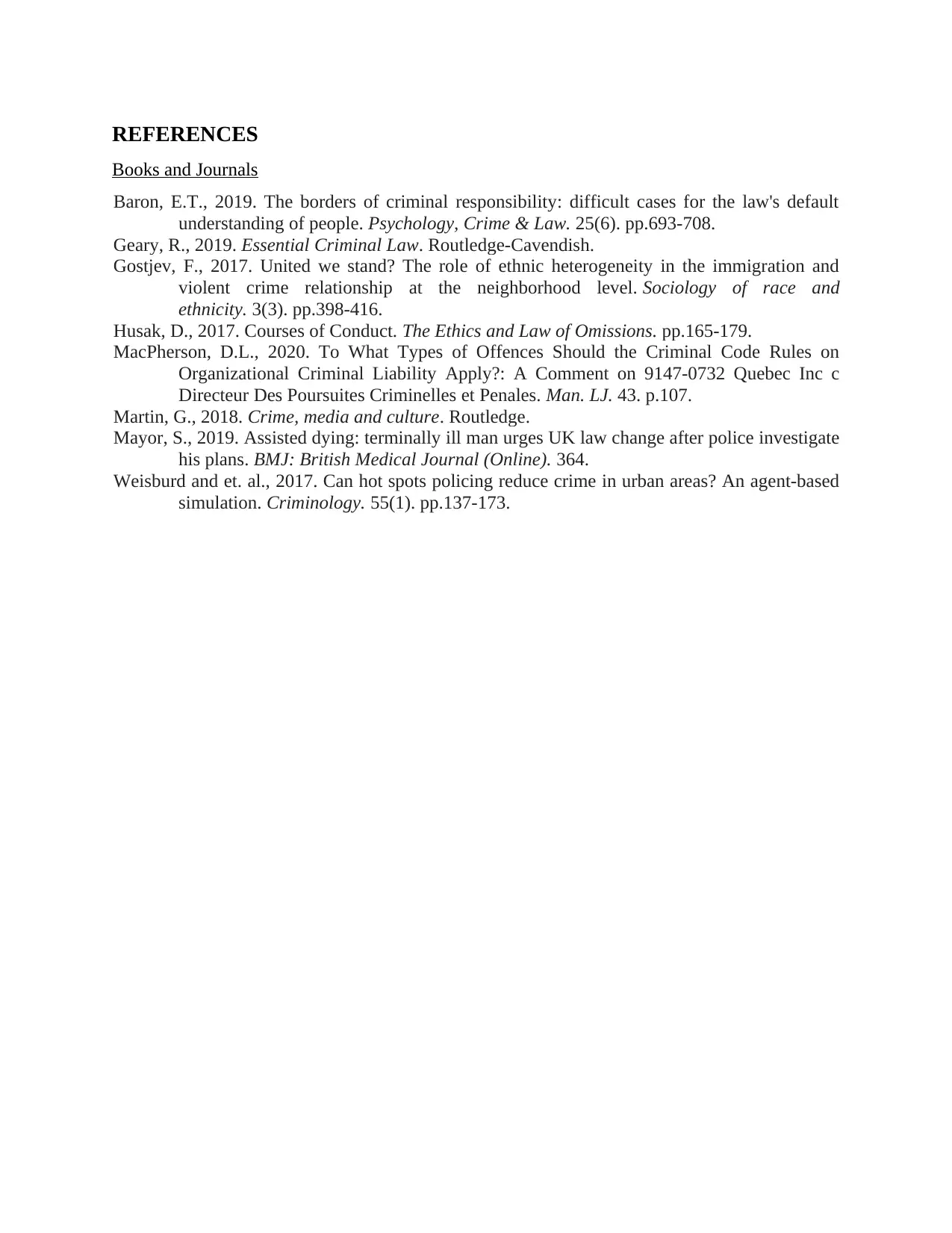
REFERENCES
Books and Journals
Baron, E.T., 2019. The borders of criminal responsibility: difficult cases for the law's default
understanding of people. Psychology, Crime & Law. 25(6). pp.693-708.
Geary, R., 2019. Essential Criminal Law. Routledge-Cavendish.
Gostjev, F., 2017. United we stand? The role of ethnic heterogeneity in the immigration and
violent crime relationship at the neighborhood level. Sociology of race and
ethnicity. 3(3). pp.398-416.
Husak, D., 2017. Courses of Conduct. The Ethics and Law of Omissions. pp.165-179.
MacPherson, D.L., 2020. To What Types of Offences Should the Criminal Code Rules on
Organizational Criminal Liability Apply?: A Comment on 9147-0732 Quebec Inc c
Directeur Des Poursuites Criminelles et Penales. Man. LJ. 43. p.107.
Martin, G., 2018. Crime, media and culture. Routledge.
Mayor, S., 2019. Assisted dying: terminally ill man urges UK law change after police investigate
his plans. BMJ: British Medical Journal (Online). 364.
Weisburd and et. al., 2017. Can hot spots policing reduce crime in urban areas? An agent‐based
simulation. Criminology. 55(1). pp.137-173.
Books and Journals
Baron, E.T., 2019. The borders of criminal responsibility: difficult cases for the law's default
understanding of people. Psychology, Crime & Law. 25(6). pp.693-708.
Geary, R., 2019. Essential Criminal Law. Routledge-Cavendish.
Gostjev, F., 2017. United we stand? The role of ethnic heterogeneity in the immigration and
violent crime relationship at the neighborhood level. Sociology of race and
ethnicity. 3(3). pp.398-416.
Husak, D., 2017. Courses of Conduct. The Ethics and Law of Omissions. pp.165-179.
MacPherson, D.L., 2020. To What Types of Offences Should the Criminal Code Rules on
Organizational Criminal Liability Apply?: A Comment on 9147-0732 Quebec Inc c
Directeur Des Poursuites Criminelles et Penales. Man. LJ. 43. p.107.
Martin, G., 2018. Crime, media and culture. Routledge.
Mayor, S., 2019. Assisted dying: terminally ill man urges UK law change after police investigate
his plans. BMJ: British Medical Journal (Online). 364.
Weisburd and et. al., 2017. Can hot spots policing reduce crime in urban areas? An agent‐based
simulation. Criminology. 55(1). pp.137-173.
⊘ This is a preview!⊘
Do you want full access?
Subscribe today to unlock all pages.

Trusted by 1+ million students worldwide
1 out of 9
Your All-in-One AI-Powered Toolkit for Academic Success.
+13062052269
info@desklib.com
Available 24*7 on WhatsApp / Email
![[object Object]](/_next/static/media/star-bottom.7253800d.svg)
Unlock your academic potential
Copyright © 2020–2026 A2Z Services. All Rights Reserved. Developed and managed by ZUCOL.